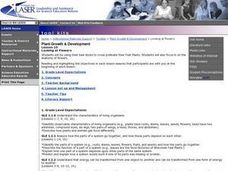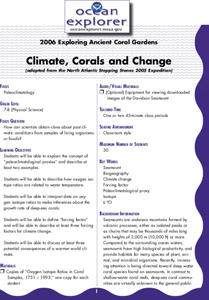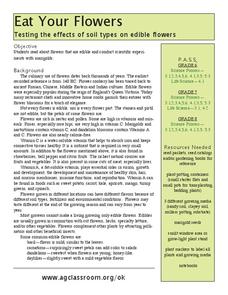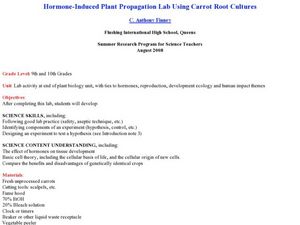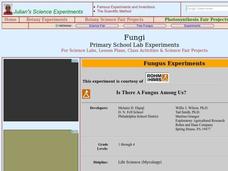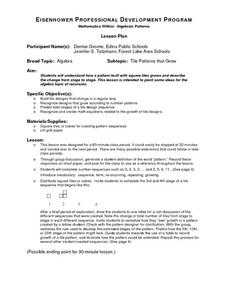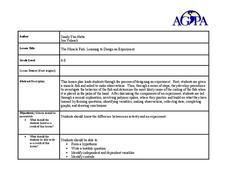Curated OER
King Cotton
Fifth graders explore the cotton plant. In this cotton lesson, 5th graders research the process of growing cotton. Students explore the economic and cultural differences in the states that grew cotton for trade and industry.
Curated OER
Observing Leaves and Flower Buds
Pupils observe the first true leaves and the buds on their Brassica plants and record their observations in both words and pictures. They also observe two major developments: the true leaves and the flower buds and record their...
Curated OER
Getting a Handle on Your Bee
Students observe dried bees, carefully glue them to toothpicks, and use them for cross pollinating their Brassica plants. They also describe reasons why two similar investigations can produce different results. Finally, students...
Curated OER
Looking at Flowers
Students use their bee sticks to cross-pollinate their Fast Plants and also focus in on the anatomy of flowers. They analyze how the parts of a system go together, and how these parts depend on each other. Finally, students describe...
NOAA
Climate, Corals and Change
Global warming isn't just an issue on land; deep ocean waters are also showing troubling signs. Young scientists learn more about deep water corals and the many recent discoveries researchers have made. Then they examine data related to...
Curated OER
Lesson 3: Life Cycle of Brassica Plants
Students investigate the life cycle of brassica plants. In this science instructional activity, students observe each stage in the life cycle of their plant. Students record their observations and graph the data. Students
Curated OER
Roots of the World
Students recognize consist stems, trunks, leaves, and roots. They compare different types of roots by observing and comparing photographs. Aterwards, they observe the growth of a lima bean plant and document changes in root and shoot...
Curated OER
Selecting Trees for Urban Environments
High schoolers consider the best place to plant a tree. In this environment lesson, students identify urban locations that are compatible with particular tree types. High schoolers decide what trees would go where and why they would...
Curated OER
You Gotta Know the Territory
Students examine the relationship between Native Americans and those who settled the Iowa territory. In this Iowa history lesson, students investigate the process for settling the territory and how intercultural relationships developed...
Curated OER
Eat Your Flowers
Young scholars grow flowers in different soil mediums to determine the effect on flavor. In this investigative lesson students study flowers, plant them and taste them to see how they differ in different potting soils.
Curated OER
Designing a Germination Experiment - Part 1
Students experiment with seeds and germination. In this natural science lesson, students discuss the stages of germination. Students engage in a 4 part hands on science activity to view the process of germination.
Curated OER
Do Plants Need Water?
First graders observe the effects of varying amounts of water, sun, and air on lima bean plants. They also predict and describe their outcomes in a written report.
Curated OER
Where Are The Dinosaurs?
Students examine the concept of extinction in relationship to the dinosaurs. In this elementary science lesson plan students become familiar with dinosaurs and that they are extinct. Students differentiate between different types of...
Curated OER
Hormone-Induced Plant Propagation Lab using Carrot Root Cultures
Young scholars evaluate the importance of hormones in living things. In this biology lesson plan, students experiment on carrots to differentiate how humans and plants reproduce. They collect data from experiment to answer analysis...
Curated OER
Berenstain Bears: Grow It
Second graders read several books and complete an activity that coincides with each book. i.e. They read 'Berenstain Bears: Grow It' by Stan and Jan Berenstain and then decorate a flower pot, plant flower seeds in it and record their...
Curated OER
Humane Science Projects
In this science worksheet, students examine the list of possible science projects. They look for the characteristics that set apart these ideas as humane.
Curated OER
Fungi
Students examine the characteristics of fungi. In this biology lesson, students investigate the factors needed for fungi growth. They collect data and observations and write a report about them.
Curated OER
Life Cycles
Students are introduced to the concept of life cycles and identify the growth order and different stages attained by various animals. They view slideshows and video of butterflies and frogs as they change through the various stages of...
Curated OER
Vegie Gardening
Students investigate the concept of Veggie Gardening and develop the plans for a successful yield of crops. They answer some practical questions and then apply the information to the horticulture garden. The project includes finding the...
Curated OER
Tile Patterns that Grow
Middle schoolers explore how a pattern built with square tiles grows and describe the change from stage to stage. They predict later stages of a tile design sequence and create math equations related to the growth of tile designs.
Curated OER
See How They Grow: Plants And Their Parts
Young scholars discuss what plants require in order to grow, identify plant parts and their functions and discuss a video about plants. They conduct a controlled experiment with bean seeds and then record and observe the bean plants.
Curated OER
The Miracle Fish: Learning to Design an Experiment
Students develop procedures to explore the behavior of fish. In this scientific experiment lesson students from a hypothesis, write a question, identify different variables and controls in their experiment.
Curated OER
Flowering Phenology: How Do Plants Know When to Flower?
Students study the process of plant reproduction and the biotic and abiotic factors that affect flowering phenology. In this plant reproduction lesson, students describe the interaction of environmental factors as it relates to...
Curated OER
What Do Parts Do?
Students review the components of the scientific inquiry method. In groups, they identify and describe the components and functions of all of the parts of a plant. Using a diagram, they label the parts of the plant chosen and share...





